高考英语情态动词经典习题(含答案)
- 格式:doc
- 大小:72.00 KB
- 文档页数:10
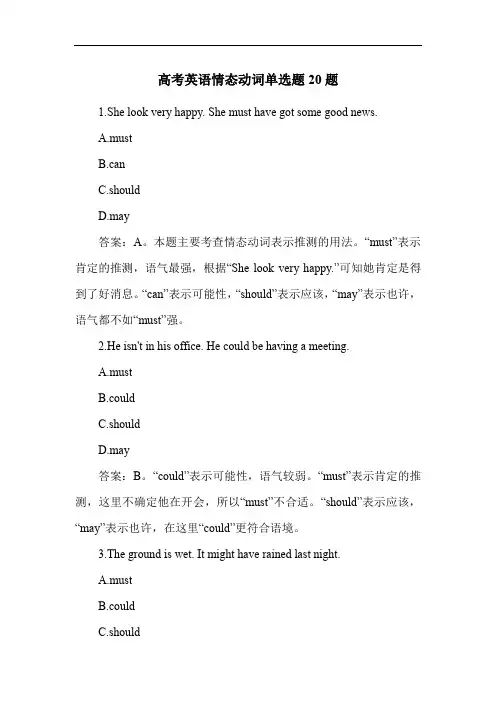
高考英语情态动词单选题20题1.She look very happy. She must have got some good news.A.mustB.canC.shouldD.may答案:A。
本题主要考查情态动词表示推测的用法。
“must”表示肯定的推测,语气最强,根据“She look very happy.”可知她肯定是得到了好消息。
“can”表示可能性,“should”表示应该,“may”表示也许,语气都不如“must”强。
2.He isn't in his office. He could be having a meeting.A.mustB.couldC.shouldD.may答案:B。
“could”表示可能性,语气较弱。
“must”表示肯定的推测,这里不确定他在开会,所以“must”不合适。
“should”表示应该,“may”表示也许,在这里“could”更符合语境。
3.The ground is wet. It might have rained last night.A.mustB.couldC.shouldD.might答案:D。
“might”表示可能性较小的推测。
“must”表示肯定的推测,“could”可能性比“might”大一些,“should”表示应该,这里说地面湿了,只是有可能昨晚下雨了,所以“might”最合适。
4.There is a lot of noise coming from the next room. They must be having a party.A.mustB.canC.shouldD.may答案:A。
“must”表示肯定的推测,根据“There is a lot of noise coming from the next room.”可以推断出他们肯定在开派对。
“can”表示可能性,“should”表示应该,“may”表示也许,语气都不如“must”强。
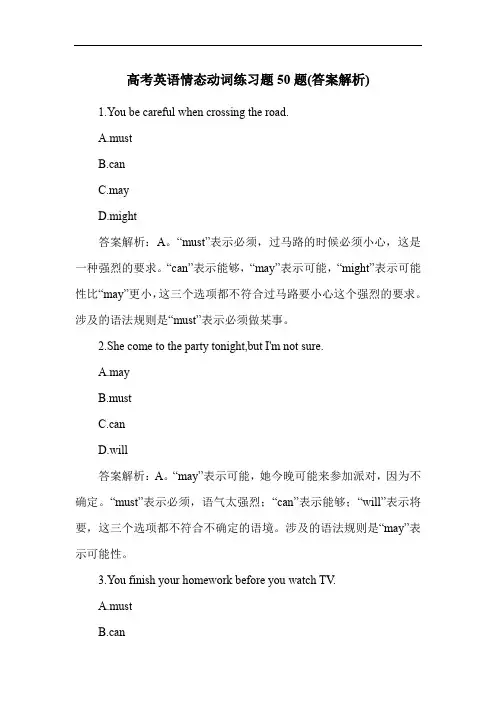
高考英语情态动词练习题50题(答案解析)1.You be careful when crossing the road.A.mustB.canC.mayD.might答案解析:A。
“must”表示必须,过马路的时候必须小心,这是一种强烈的要求。
“can”表示能够,“may”表示可能,“might”表示可能性比“may”更小,这三个选项都不符合过马路要小心这个强烈的要求。
涉及的语法规则是“must”表示必须做某事。
2.She come to the party tonight,but I'm not sure.A.mayB.mustC.canD.will答案解析:A。
“may”表示可能,她今晚可能来参加派对,因为不确定。
“must”表示必须,语气太强烈;“can”表示能够;“will”表示将要,这三个选项都不符合不确定的语境。
涉及的语法规则是“may”表示可能性。
3.You finish your homework before you watch TV.A.mustB.canC.mayD.might答案解析:A。
“must”表示必须,先完成作业才能看电视,是一种规定。
“can”表示能够,“may”表示可能,“might”表示可能性比“may”更小,这三个选项都不符合规定的语境。
涉及的语法规则是“must”用于表示必须做某事。
4.He be very tired after a long day at work.A.mustB.canC.mayD.might答案解析:A。
工作了一整天后他肯定很累,“must”表示肯定的推测。
“can”表示能够,“may”表示可能,“might”表示可能性比“may”更小,这三个选项都不如“must”的推测强烈。
涉及的语法规则是“must”表示肯定的推测。
5.We take an umbrella.It might rain later.A.mustB.canC.mayD.should答案解析:D。
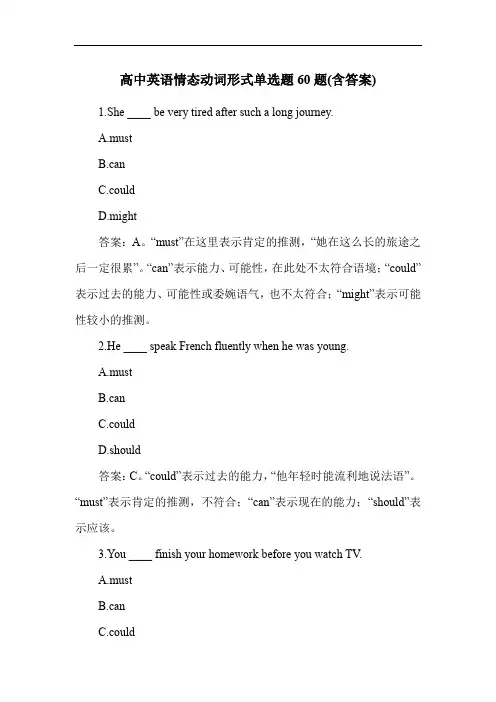
高中英语情态动词形式单选题60题(含答案)1.She ____ be very tired after such a long journey.A.mustB.canC.couldD.might答案:A。
“must”在这里表示肯定的推测,“她在这么长的旅途之后一定很累”。
“can”表示能力、可能性,在此处不太符合语境;“could”表示过去的能力、可能性或委婉语气,也不太符合;“might”表示可能性较小的推测。
2.He ____ speak French fluently when he was young.A.mustB.canC.couldD.should答案:C。
“could”表示过去的能力,“他年轻时能流利地说法语”。
“must”表示肯定的推测,不符合;“can”表示现在的能力;“should”表示应该。
3.You ____ finish your homework before you watch TV.A.mustB.canC.could答案:A。
“must”表示必须,“你必须在看电视之前完成作业”。
“can”表示能力、可能性;“could”表示过去的能力、可能性或委婉语气;“may”表示可能。
4.____ I borrow your pen?A.MustB.CanC.CouldD.Will答案:B。
“Can I...?”表示请求,“我能借你的笔吗?”“Must”表示必须,语气太强;“Could”用于更委婉的请求,但不如“Can”常用;“Will”表示将来。
5.She ____ have forgotten her keys. She's always so careful.A.can'tB.mustn'tC.shouldn'tD.needn't答案:A。
“can't”表示否定的推测,“她不可能忘了钥匙,她总是很细心”。
“mustn't”表示禁止;“shouldn't”表示不应该;“needn't”表示不必。
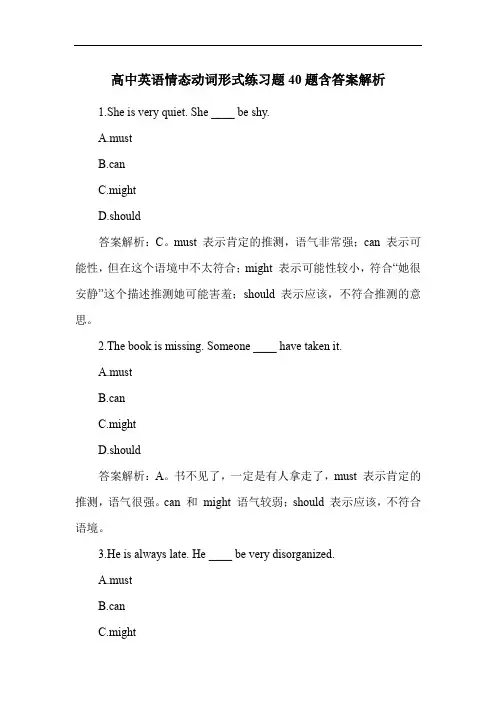
高中英语情态动词形式练习题40题含答案解析1.She is very quiet. She ____ be shy.A.mustB.canC.mightD.should答案解析:C。
must 表示肯定的推测,语气非常强;can 表示可能性,但在这个语境中不太符合;might 表示可能性较小,符合“她很安静”这个描述推测她可能害羞;should 表示应该,不符合推测的意思。
2.The book is missing. Someone ____ have taken it.A.mustB.canC.mightD.should答案解析:A。
书不见了,一定是有人拿走了,must 表示肯定的推测,语气很强。
can 和might 语气较弱;should 表示应该,不符合语境。
3.He is always late. He ____ be very disorganized.A.mustB.canC.might答案解析:A。
他总是迟到,肯定是非常没有条理,must 表示肯定的推测,语气强。
can 和might 可能性较小;should 表示应该,不合适。
4.The lights are on. Someone ____ be at home.A.mustB.canC.mightD.should答案解析:A。
灯亮着,肯定有人在家,must 表示肯定的推测,语气强。
can 和might 可能性较小;should 表示应该,不符合语境。
5.The test was very difficult. She ____ have passed it.A.mustB.canC.mightD.should答案解析:C。
考试很难,她可能通过了,might 表示可能性较小。
must 语气太强;can 表示可能性,但不太符合这个语境;should 表示应该,不符合推测的意思。
6.He looks very tired. He ____ have worked hard.A.mustB.canD.should答案解析:A。

高中情态动词专项练习200题Ⅰ.情态动词的特征:①本身有词义;②不能独立作谓语;③后接动词原形一起构成谓语;④不随人称和数的变化。
Ⅱ.情态动词各自的基本意义及用法:1.can 与could用法2.may与might用法3.must与have to用法4.need与dare用法5.should与ought to用法6.shall与will用法7.used to与would用法Ⅲ.情态动词表推测:1.大多数情态动词(除表‘能力、许可、意志’外),都可以表示推测,其程度有差异。
按可能性程度的高低排列为:must﹥will ﹥would ﹥ought to ﹥should完全肯定完全可能很可能﹥can ﹥could﹥may ﹥might可能有可能2.区分情态动词的否定含义:may not或许不、可能不might not可能不can’t 不可能mustn’t不许、禁止shouldn’t不应该needn’t 不必3.情态动词表推测具体运用:情态动词可以对现在、进行、过去推测。
4.表示反劝的特殊的表推测形式5.注意:Ⅳ.情态动词表推测的反意疑问句1.情态动词表推测的反意疑问句,简单来说,就是以情态动词后的时态为淮,如句子里有明确的时间状语,则以其为准。
2.以must 为例:e.g.: 1.You must be hungry now, aren’t you?2.He must be watching TV , isn’t he ?3.Tom must have lived her for a long time, hasn’t he ?4.She must have arrived yesterday, didn’t she?注:如选择题中(以She must have arrived yesterday, didn’t she?为例)既有didn’t she又有hasn’t she 则以didn’t she?为最佳答案。
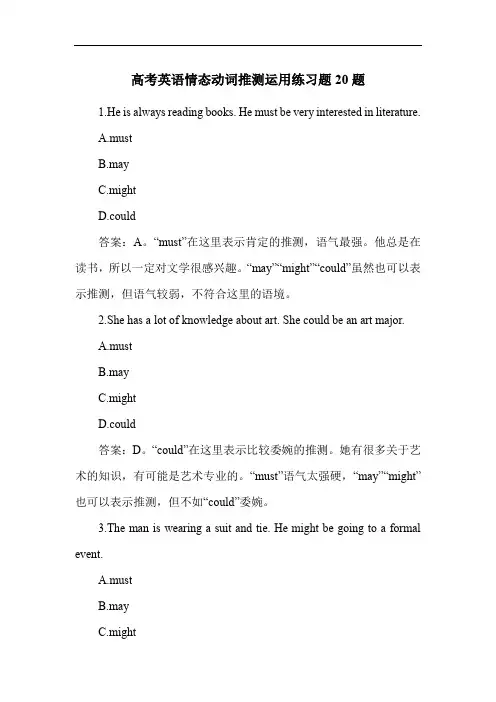
高考英语情态动词推测运用练习题20题1.He is always reading books. He must be very interested in literature.A.mustB.mayC.mightD.could答案:A。
“must”在这里表示肯定的推测,语气最强。
他总是在读书,所以一定对文学很感兴趣。
“may”“might”“could”虽然也可以表示推测,但语气较弱,不符合这里的语境。
2.She has a lot of knowledge about art. She could be an art major.A.mustB.mayC.mightD.could答案:D。
“could”在这里表示比较委婉的推测。
她有很多关于艺术的知识,有可能是艺术专业的。
“must”语气太强硬,“may”“might”也可以表示推测,但不如“could”委婉。
3.The man is wearing a suit and tie. He might be going to a formal event.A.mustB.mayC.might答案:C。
“might”在这里表示比较弱的推测。
这个男人穿着西装打着领带,可能是要去一个正式的活动。
“must”语气太肯定,“may”“could”也可以表示推测,但“might”更符合语境。
4.The room is very clean. She may have cleaned it.A.mustB.mayC.mightD.could答案:B。
“may”在这里表示有可能的推测。
房间很干净,她有可能打扫了。
“must”语气太强硬,“might”“could”也可以表示推测,但“may”更符合语境。
5.There are many books on the desk. He could be a student.A.mustB.mayC.mightD.could答案:D。
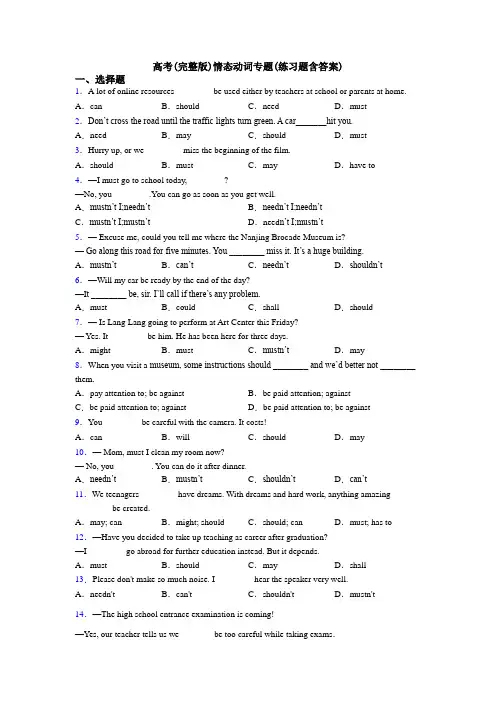
高考(完整版)情态动词专题(练习题含答案)一、选择题1.A lot of online resources ________ be used either by teachers at school or parents at home. A.can B.should C.need D.must2.Don’t cross the road until the traffic lights turn green. A car_______hit you.A.need B.may C.should D.must3.Hurry up, or we ________ miss the beginning of the film.A.should B.must C.may D.have to4.—I must go to school today, ________?—No, you ________.You can go as soon as you get well.A.mustn’t I;needn’t B.needn’t I;needn’tC.mustn’t I;mustn’t D.need n’t I;mustn’t5.— Excuse me, could you tell me where the Nanjing Brocade Museum is?—Go along this road for five minutes. You ________ miss it. It’s a huge building. A.mustn’t B.can’t C.needn’t D.shouldn’t 6.—Will my car be ready by the end of the day?—I t ________ be, sir. I’ll call if there’s any problem.A.must B.could C.shall D.should7.— Is Lang Lang going to perform at Art Center this Friday?— Yes. It ________ be him. He has been here for three days.A.might B.must C.mustn’t D.may8.When you visit a museum, some instructions should ________ and we’d better not ________ them.A.pay attention to; be against B.be paid attention; againstC.be paid attention to; against D.be paid attention to; be against9.You ________ be careful with the camera. It costs!A.can B.will C.should D.may10.— Mom, must I clean my room now?— No, you ________. You can do it after dinner.A.needn’t B.mustn’t C.shouldn’t D.can’t11.We teenagers ________ have dreams. With dreams and hard work, anything amazing________ be created.A.may; can B.might; should C.should; can D.must; has to 12.—Have you decided to take up teaching as career after graduation?—I ________ go abroad for further education instead. But it depends.A.must B.should C.may D.shall 13.Please don't make so much noise. I ________ hear the speaker very well.A.needn't B.can't C.shouldn't D.mustn't 14.—The high school entrance examination is coming!—Yes, our teacher tells us we _______ be too careful while taking exams.A.mustn't B.shouldn't C.needn't D.can't15.You ______ pay too much attention to your pronunciation, as it is so important in the oral (口头的) test.A.shouldn’t B.mustn’t C.can’t D.needn’t 16.—Would you please________in that way? That’s not safe!—Sorry. I won’t do it any more.A.not driving B.not to drive C.no driving D.not drive 17.Dr. Zhong Nanshan once said, "To prevent the spread of this disease, we________never be too careful."A.can B.may C.must D.should18.—Will your mother be at home this Saturday?—Hard to say. She _______go to the countryside to see my grandparents.A.must B.may C.can D.would19.Think twice before making a decision, or you __________ get into trouble.A.may B.can't C.shouldn't D.mustn't20.I ________ hear you clearly. Would you please repeat it?A.mustn’t B.can’t C.needn’t D.shou ldn’t 21.Look at the floor, Tom! ________ you watch TV while having a meal?A.Should B.Could C.Must D.May22.You _________ smoke here! Look at the sign. It says "No smoking".A.needn't B.mustn't C.can D.may23.— Listen! Tom ________ be listening to the music while doing his homework.—Let’s go upstairs to remind him to turn it off.A.should B.could C.would D.must24.—Will Jim come to Yangzhou for a holiday?—He ________come and it depends on how much homework he will have.A.may B.should C.must D.need25.—In China, many parents complain that their children have to stay up late to do the homework.—Don’t worry. The government has realized the problem. I’m sure there ________ be good news soon.A.can B.should C.need D.must26.I think all the students love the weekends because, to them, they ________ get up early on Saturdays or Sundays.A.mustn’t B.don’t need C.needn’t D.can’t27.When people are waiting at the zebra crossing, cars and buses ________ wait and let them go first.A.must B.may C.can D.need28.—Shall I tell him the change of the time right now?—I’m afraid you ________, otherwise he will be late for the meeting.A.can B.may C.must D.need29.It’s of great importance to protect the environment. Each of us ________ take an active part in it.A.can B.may C.would D.should 30.—Must we stop the Japanese government discharging nuclear waste water (排放核污水) into the Pacific Ocean?—________. Because everyone should protect our earth and it is bad ________ us to eat the polluted seafood and drink the waste water.A.Yes, we can; of B.No, we mustn’t; of C.Yes, we must; for D.No, we needn’t; for 31.According to the rule, used batteries ________ be dropped in the red bin for harmful wastes. A.may B.would C.should D.might32.Cars ________ give way to walkers on some roads in Binhai, or the drivers will be fined. A.may B.will C.can D.must33.Mr. Black ________ be at home now. He went abroad on vacation last Friday.A.can’t B.mustn’t C.needn’t D.shouldn’t 34.—How beautiful the winter jasmines (迎春花) are!—Yes. These golden-yellow flowers ________ be widely seen in my city in March.A.must B.can C.would D.should35.— What do you think of the show yesterday?— Some of them were really good but others ________ be better.A.will B.must C.need D.can 36.—Who’s the man over ther e? Is that Mr. Black?—It ________ be him. Mr. Black is much taller than that man.A.may B.must C.can’t D.mustn’t37.—________ I see your ID card? We have to check your personal information.—Sure. Here you are.A.May B.Need C.Should D.Must38.—I don’t care what people think.—Well, you _______ . Some opinions are worth weighing.A.should B.might C.could D.would39.—I think they are enough. We ________ make so many chairs.—I don’t think so. Because nearly a quarter of them need ________.A.don’t need to; mending B.needed; to be mendedC.don’t need; mend D.need; to mend40.—Seventy dollars for such a dress! You ________ be joking!—I’m serious. It’s made of silk from Hangzhou.A.must B.need C.will D.can【参考答案】一、选择题1.A解析:A【详解】句意:很多在线资源既可以供学校的老师使用,也可以供家长在家使用。

高中英语情态动词形式练习题40题含答案解析1.You come to the party tonight if you finish your homework.A.canB.couldC.mayD.might答案解析:A。
“can”表示有能力或有机会做某事,在这里表示如果你完成作业就有机会来参加今晚的派对。
“could”和“might”语气较委婉,“may”通常表示可能性。
在这个语境中,强调有能力和机会,用“can”最合适。
2.She pass the exam if she studies hard.A.canB.couldC.mayD.might答案解析:A。
同样,这里强调如果她努力学习就有能力通过考试,“can”表示能力。
“could”“might”语气委婉,“may”表示可能性,这里突出能力,所以选“can”。
3. you help me with this math problem?A.CanB.CouldC.May答案解析:B。
这里用“could”表示委婉地请求,“can”语气较直接,“may”和“might”在这个语境中不太符合请求的语气。
4.I ask you a question?A.CanB.CouldC.MayD.Might答案解析:C。
“may”用于请求许可比较正式,“can”也可以用于请求但相对不那么正式,“could”和“might”语气委婉但在这里不太符合直接请求的语境。
5. he come to school late today?A.CanB.CouldC.MayD.Might答案解析:D。
“might”在这里表示对可能性的较小推测,他今天有可能会迟到吗?“can”和“could”通常不用于这种较小可能性的推测,“may”也不太符合这个语境。
6. you lend me your pen?A.CanB.CouldD.Might答案解析:B。
“could”表示委婉地请求借笔,“can”语气较直接,“may”和“might”不太符合请求借东西的语境。
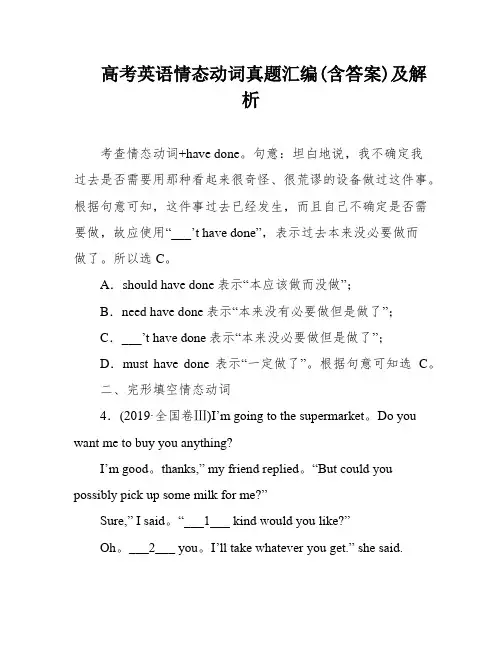
高考英语情态动词真题汇编(含答案)及解析考查情态动词+have done。
句意:坦白地说,我不确定我过去是否需要用那种看起来很奇怪、很荒谬的设备做过这件事。
根据句意可知,这件事过去已经发生,而且自己不确定是否需要做,故应使用“___’t have done”,表示过去本来没必要做而做了。
所以选C。
A.should have done表示“本应该做而没做”;B.need have done表示“本来没有必要做但是做了”;C.___’t have done表示“本来没必要做但是做了”;D.must have done表示“一定做了”。
根据句意可知选C。
二、完形填空情态动词4.(2019·全国卷Ⅲ)I’m going to the supermarket。
Do you want me to buy you anything?I’m good。
thanks,” my friend replied。
“But could you possibly pick up some milk for me?”Sure,” I said。
“___1___ kind would you like?”Oh。
___2___ you。
I’ll take whatever you get.” she said.I ___3___ the supermarket and picked up a gallon of milk。
When I got to the checkout。
I ___4___ that the line was long and there was only one cashier working。
I ___5___ my head and sighed。
___6___ that it was going to take a while.Just as I was about to ___7___ the line。
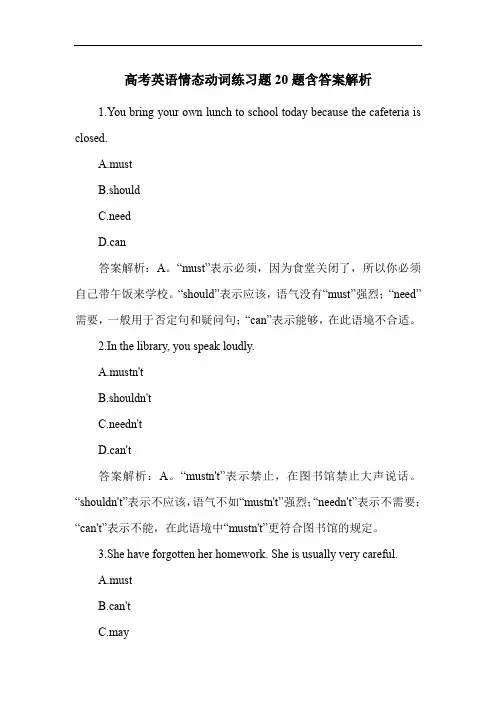
高考英语情态动词练习题20题含答案解析1.You bring your own lunch to school today because the cafeteria is closed.A.mustB.shouldC.needD.can答案解析:A。
“must”表示必须,因为食堂关闭了,所以你必须自己带午饭来学校。
“should”表示应该,语气没有“must”强烈;“need”需要,一般用于否定句和疑问句;“can”表示能够,在此语境不合适。
2.In the library, you speak loudly.A.mustn'tB.shouldn'tC.needn'tD.can't答案解析:A。
“mustn't”表示禁止,在图书馆禁止大声说话。
“shouldn't”表示不应该,语气不如“mustn't”强烈;“needn't”表示不需要;“can't”表示不能,在此语境中“mustn't”更符合图书馆的规定。
3.She have forgotten her homework. She is usually very careful.A.mustB.can'tC.may答案解析:C。
“may”表示可能,她通常很细心,但是这次有可能忘记了作业。
“must”表示一定,语气太肯定;“can't”表示不可能,与后面的“usually very careful”不太符合;“should”表示应该,不符合语境。
4.We go to the park if it doesn't rain tomorrow.A.canB.mustC.shouldD.need答案解析:A。
“can”表示能够,如果明天不下雨我们能够去公园。
“must”表示必须,语气不合适;“should”表示应该;“need”表示需要,都不符合语境。
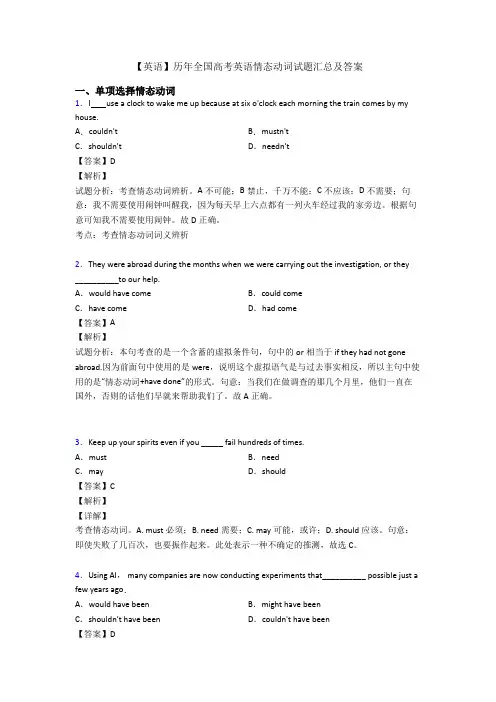
【英语】历年全国高考英语情态动词试题汇总及答案一、单项选择情态动词1.I use a clock to wake me up because at six o'clock each morning the train comes by my house.A.couldn't B.mustn'tC.shouldn't D.needn't【答案】D【解析】试题分析:考查情态动词辨析。
A不可能;B禁止,千万不能;C不应该;D不需要;句意:我不需要使用闹钟叫醒我,因为每天早上六点都有一列火车经过我的家旁边。
根据句意可知我不需要使用闹钟。
故D正确。
考点:考查情态动词词义辨析2.They were abroad during the months when we were carrying out the investigation, or they __________to our help.A.would have come B.could comeC.have come D.had come【答案】A【解析】试题分析:本句考查的是一个含蓄的虚拟条件句,句中的or相当于if they had not gone abroad.因为前面句中使用的是were,说明这个虚拟语气是与过去事实相反,所以主句中使用的是“情态动词+have done”的形式。
句意:当我们在做调查的那几个月里,他们一直在国外,否则的话他们早就来帮助我们了。
故A正确。
3.Keep up your spirits even if you _____ fail hundreds of times.A.must B.needC.may D.should【答案】C【解析】【详解】考查情态动词。
A. must必须;B. need需要;C. may可能,或许;D. should应该。
句意:即使失败了几百次,也要振作起来。
2020-2021年历年全国高考英语情态动词试题汇总及答案一、单项选择情态动词1.While it wasn’t the goal of the trip, I was rewarded with fresh insights, ones that ________ to me during the regular course of business.A.might never happen B.could never have happenedC.should not happen D.nee dn’t have happened【答案】B【解析】【详解】考查虚拟语气。
句意:虽然这并不是这次旅行的目的,但我得到了一些新的领悟,那些领悟在我的日常生活中是本不可能发生的。
此处考查虚拟语气,“我得到新的领悟”发生在过去,故此处是与过去事实相反,应用could/might/would/need/should+have done,“本不可能发生”是could never have happened,故选B项。
【点睛】本题考查“情态动词+have done”的虚拟语气,其常用表达有:could have done本能做某事而未做couldn’t have done不可能做了某事should have done本应该做某事而未做shouldn’t have done本不应该做某事而做了would have done本会某事而未做wouldn’t have done本不会做某事而做了need have done本需要做某事而未做needn’t have done本不必要做某事而做了2.Mr. Baker, some students want to see you. ______ they wait here or outside?A.May B.Should C.Shall D.Will【答案】C【解析】【详解】考查Shall的用法。
高考英语情态动词单选题30题1. In the future, robots ____ do all the heavy work for us.A.mustB.canC.couldD.may答案:B。
“can”表示能力,未来机器人有能力为我们做所有繁重的工作。
“must”表示必须,语气过于强硬;“could”表示过去的能力或可能性,时态不符;“may”表示可能性,语气较弱且不符合语境。
2. According to the latest research, this new drug ____ cure some types of cancer.A.mustB.canC.couldD.might答案:B。
“can”表示有能力做某事,最新研究表明这种新药有能力治愈某些类型的癌症。
“must”表示必须,太绝对;“could”表示过去的能力或可能性,时态不符;“might”表示可能性很小,不符合语境。
3. The famous author's works ____ be read by people all over the world.A.mustB.canC.couldD.may答案:B。
“can”表示可能性,著名作家的作品能够被全世界的人阅读。
“must”表示必须,语气不对;“could”表示过去的能力或可能性,时态不符;“may”表示可能性较小,不符合语境。
4. With advanced technology, we ____ communicate with people on the other side of the world instantly.A.mustB.canC.couldD.may答案:B。
“can”表示能力,有了先进的技术我们能够即时和世界另一端的人交流。
“must”表示必须,不合适;“could”表示过去的能力或可能性,时态不符;“may”表示可能性较小,不符合语境。
高考英语情态动词单选题30题1.She be very tired after such a long journey. She has been on the road for over ten hours.A.mustB.canC.shouldD.need答案:A。
本题主要考查情态动词表示推测的用法。
“must”表示非常肯定的推测,根据后文她已经在路上走了十多个小时,所以一定很累。
“can”表示可能性,一般用于否定句或疑问句中表示推测。
“should”表示应该,通常表示一种责任或义务,不是推测。
“need”表示需要,不是推测的用法。
2.The weather forecast said it rain tomorrow, but it's not certain.A.mightB.mustC.shouldD.will答案:A。
“might”表示可能性较小的推测。
天气预报说明天可能下雨,但不确定,所以用“might”。
“must”表示非常肯定的推测,不符合语境。
“should”表示应该,不是推测的用法。
“will”表示将来会发生的事情,不是推测。
3.The door is locked. He be at home.B.mustn'tC.shouldn'tD.needn't答案:A。
“can't”表示否定的推测,意为“不可能”。
门是锁着的,所以他不可能在家。
“mustn't”表示禁止,不是推测的用法。
“shouldn't”表示不应该,不是推测的用法。
“needn't”表示不需要,不是推测的用法。
4.There is a lot of noise coming from the classroom. The students be having a party.A.mustB.canC.shouldD.would答案:A。
“must”表示非常肯定的推测。
情态动词常见的情态动词有:can 能may 可以will,would (表意愿)need 需要dare 敢must 必须have to 不得不shall,should 应该(表义务)ought to 应该1.can,could 的用法1.1表能力,有“能”、“会”、“能够”的意思例如:Can you drive a car? 你会开车吗?-----Yes, I can. 我会。
-----No, I can't. 我不会。
1.2表允许,在口语中代替may,有“可以”的意思例如:Can I use your bike?我可以用你的自行车吗?1.3表示可能性,常用于否定句和疑问句例如:Can it be true?那会是真的吗?Today is Sunday. He can't be at school.今天是星期天。
他不可能在学校里。
1.4过去式could表示的语气更加委婉、客气例如:Could I come to see you tomorrow?明天我可以来见你吗?1.5 can 和be able to 的比较1) can 只有一般现在时和一般过去时两种时态(could),其他时态要用be able to的形式例如:I haven't been able to get in touch with her.我一直没能和她联系上。
2) 通常can 和be able to 可以互换例如:He will come if he can.如果可能的话,他一定会来。
2.may,might的用法2.1表示许可或征求对方的许可,有“可以”的意思。
例如:You may go now.你可以走了。
May I use your computer?我用一下你的电脑可以吗?2.2回答以may开头的疑问句有如下表达法:例如:May I smoke here? 我可以在这儿抽烟吗?-----Yes, you may.-----Yes, please.------No, you can't.------No, you mustn't.------No, you'd better not.2.3表示猜测,通常只用于陈述句例如:You may be right.你可能是对的。
高考情态动词练习20题1. Tom be at home. I just saw him go out.A.mustn'tB.can'tC.needn'tD.shouldn't答案解析:B。
“can't”表示“不可能”,符合语境,因为刚刚看到汤姆出去了,所以他不可能在家。
“mustn't”表示“禁止”;“needn't”表示“不必”;“shouldn't”表示“不应该”,这三个选项都不符合题意。
2. You have finished your homework before you watch TV.A.mustB.canC.mayD.need答案解析:A。
“must”表示“必须”,符合题意,即你必须先完成作业才能看电视。
“can”表示“能够”;“may”表示“可以”;“need”表示“需要”,这三个选项都不能准确表达该语境下的义务。
3. She speak three languages fluently.A.mustB.canC.shouldD.need答案解析:B。
“can”表示“能够”,在这里表示她能够流利地说三种语言。
“must”表示“必须”,不符合语境;“should”表示“应该”;“need”表示“需要”,这两个选项也不合适。
4. I be wrong, but I think he is from Canada.A.mayB.mustC.shouldD.need答案解析:A。
“may”表示“可能”,符合语境,即我可能是错的。
“must”表示“一定”,语气太肯定;“should”表示“应该”;“need”表示“需要”,都不符合该语境。
5. You go to school on foot. It's not far.A.mustB.canC.shouldD.need答案解析:B。
“can”表示“可以”,在这里表示你可以步行去上学,因为不远。